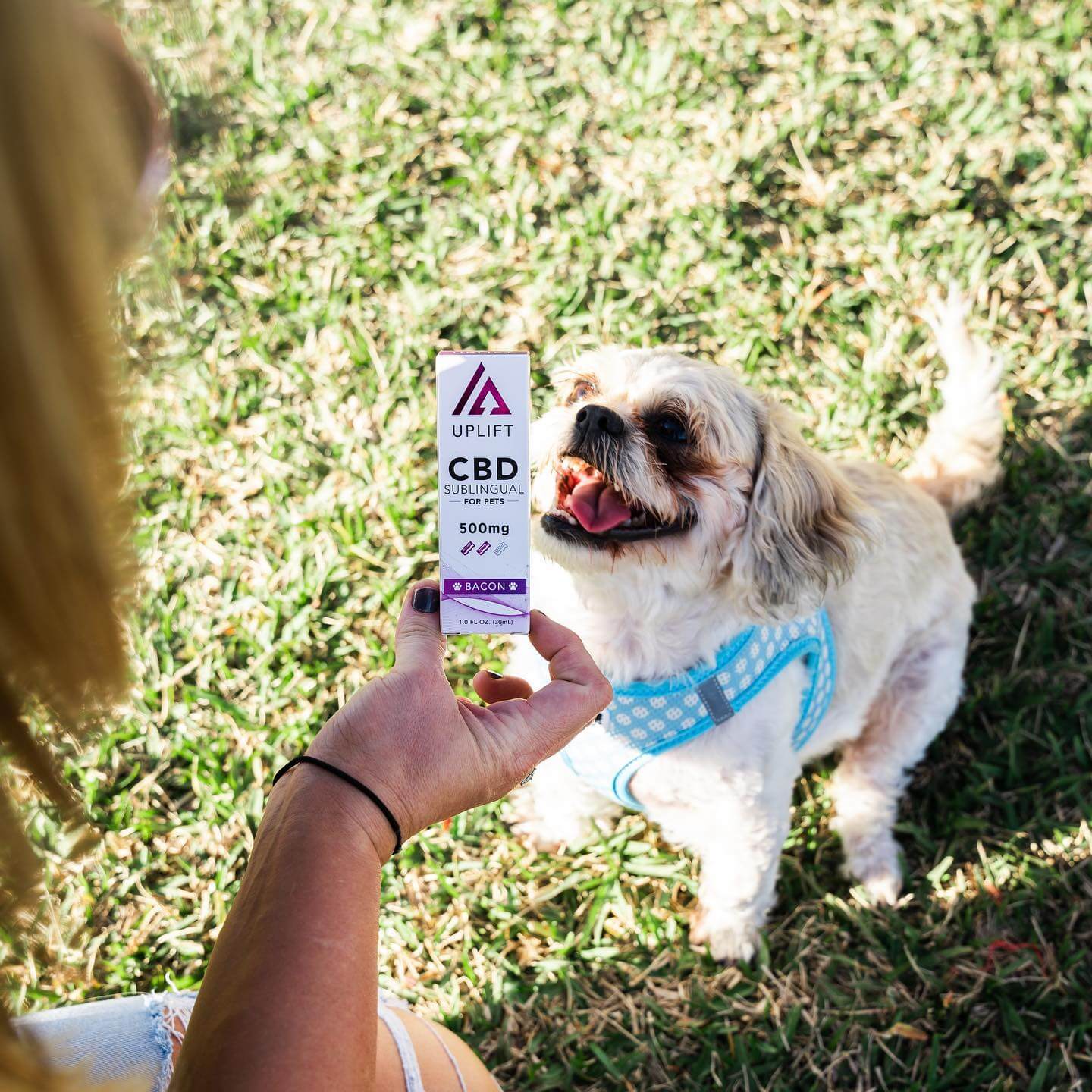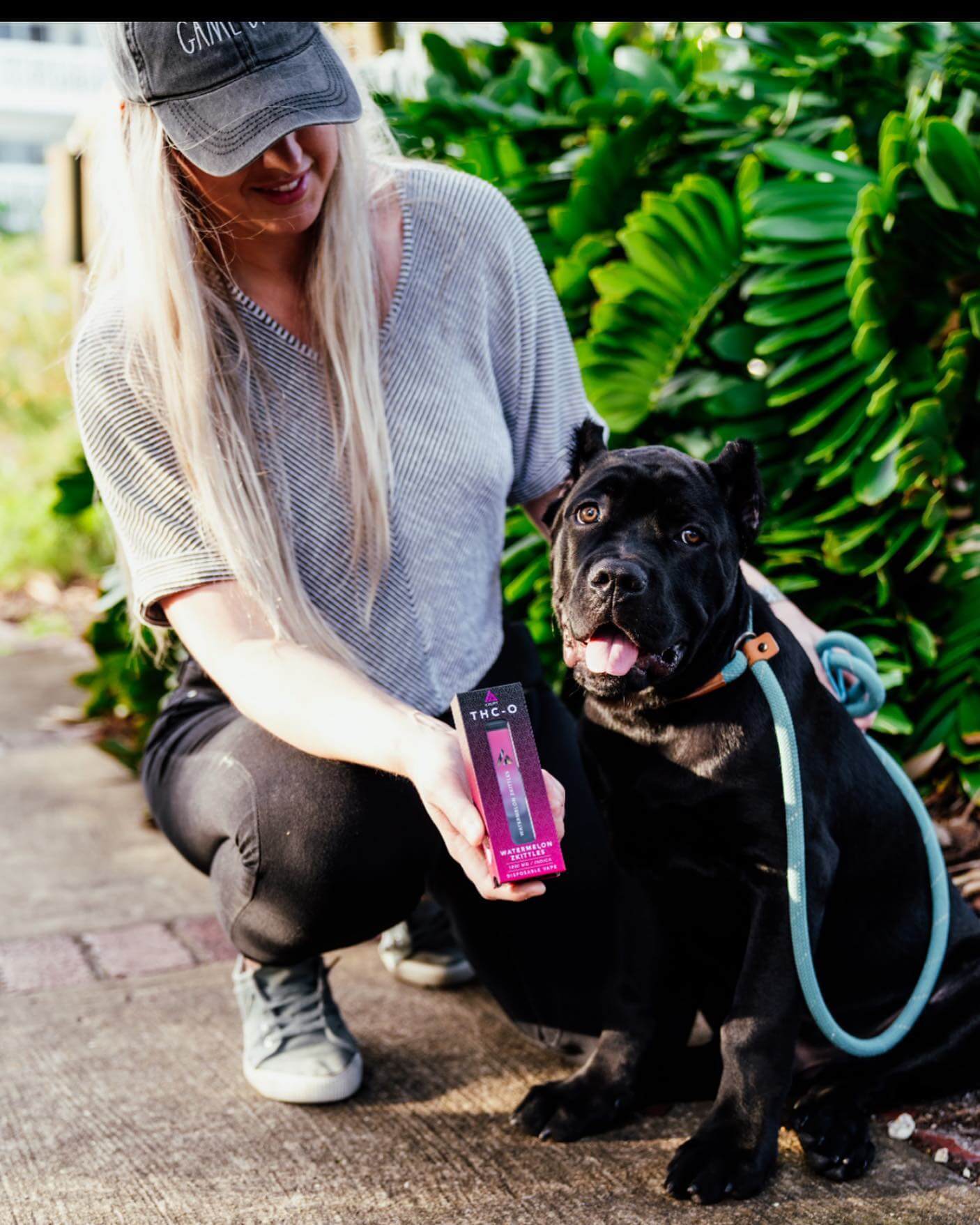What does CBD do for dogs? Cannabidiol, one of the many compounds found in cannabis plants, is believed to help dogs with various issues like anxiety, seizures, and cancer. You might wonder how a single substance can address such different problems. Well, it’s because cannabinoids, like CBD and THC, copy the natural chemicals our bodies make, called endocannabinoids. These endocannabinoids have receptors all over our bodies. Think of them as traffic directors. They tell different systems in our bodies to speed up or slow down to keep things balanced
Cannabinoids interact with these receptors, but they each do it in their unique way. For example, THC can make you feel high, but CBD doesn’t do that. It’s like they’re using the same keys but opening different doors. So, CBD might help calm anxiety, reduce seizures, and maybe even slow down the growth of cancer cells in dogs, thanks to how it talks to those receptors in their bodies.
Is CBD Harmful for Dogs?
CBD, unlike THC, can lead to diarrhea and changes in liver enzymes, but this typically happens after several weeks. The reason for this is that CBD interferes with a chemical called cytochrome P450, which plays a role in breaking down many drugs in the body. This interference can make a drug less effective if its action depends on being processed by the body. Also, it can cause a drug to build up to harmful levels if it’s supposed to leave the body within a specific time frame.
If your dog is taking other medications, it’s important to talk to your vet before giving them CBD.
GET YOURS HERE!

Does CBD Work for Dogs?
While there isn’t as much research on dogs as we’d like, it’s pretty impressive that there are around 23,000 papers published on the topic. When it comes to studying CBD, scientists have looked at both lab animals and humans, and the results are pretty promising. But here’s the thing: the results can vary.
Arthritis
Many studies have looked at how CBD can help with arthritis, and the results have all been positive. In a study at Cornell University College of Veterinary Medicine, dogs were given CBD twice a day at a dose of 4.4mg per pound for a month, and they felt a lot better. Their quality of life improved, and they had less pain. Dr. Joe Wakshlag, who is an expert in this field, said that some dogs were so frail that their owners were thinking about putting them down, but after using CBD, these dogs started moving around more, even climbing stairs.
Baylor University also found similar improvements with CBD. They even discovered that CBD worked even better when it was given in a special form called a liposomal formula.
Itching
Recent dog studies, where neither the researchers nor the dog owners knew who got CBD and who got a placebo, showed that CBD can reduce itching. An Australian study by CannPal discovered that after eight weeks of treatment, CBD reduced skin problems, swelling, and itchiness by 51 percent. In the United States, ElleVet conducted a study with a product containing both CBD and another cannabinoid called CBDA, and it also helped reduce owners’ complaints of itching.
Cancer
Cannabinoids are said to help destroy cancer cells and stop them from spreading. A study at Cornell University discovered that CBD, when used alongside chemotherapy drugs, is more effective at slowing down cancer cell growth in a lab setting compared to using chemotherapy drugs alone. Veterinarians have also noticed that CBD can make cancer cells in dogs get smaller and even put them into a state of remission.
Behavior
Many dog owners look into using CBD to help with their dogs’ anxiety, particularly when it comes to reacting to loud noises. While there have been many reports from individuals about CBD’s effectiveness, there hasn’t been a formal study to prove this yet.
There’s a study from the University of Western Australia that shows some promise when it comes to using CBD for aggressive behavior in dogs. They found that shelter dogs who were often aggressive towards humans showed less aggression after being given CBD for 15 days.
A different study from the University of Kentucky found that when it comes to anxiety caused by noise, the physical signs of anxiety didn’t show a significant difference between using CBD and a placebo. In fact, CBD performed worse than a common anxiety medication called trazodone in this study. It’s worth noting that in this study, CBD was given four to six hours before the testing, which might have been too long of a wait for it to be effective.
Seizures
CBD has been talked about a lot as a way to help with seizures in dogs based on people’s personal experiences, but there’s only one study that’s been carefully done. This study from Colorado State University discovered that dogs who took CBD for 12 weeks had 33 percent fewer seizures compared to those who got a placebo. However, it didn’t work for every dog. Researchers are now planning a bigger study with higher CBD doses.
It’s important to note that THC, another compound found in cannabis, can actually trigger seizures, so it should not be in CBD products meant for managing seizures.
Also, CBD can interact with a group of enzymes called cytochrome P450, which can affect how certain anti-seizure medications work. So, it’s crucial to always get your vet’s permission before using CBD for seizure management in your dog.
Others
In lab animals, CBD has been found to help with healing bones and fighting infections. It has also been shown to be effective in treating inflammatory bowel diseases, reducing symptoms of degenerative myelopathy, relieving pain, and easing nausea. But it’s important to note that these effects have not been tested in dogs yet.
How to Choose CBD for Dogs?
When it comes to finding the best CBD product for your dog, it can be a bit overwhelming due to the wide variety available. To make an informed choice, look for products that carry the National Animal Supplement Council (NASC) Seal of Quality Assurance. Additionally, ensure that the product comes with a third-party certificate of analysis, which provides information on its potency, ingredients, and the absence of harmful substances like pesticides, heavy metals, or mycotoxins. It’s wise to avoid products intended for human consumption, as they may contain hazardous components like xylitol.
When making your selection, opt for products that contain a mix of cannabinoids and terpenes derived from the cannabis plant. CBD tends to work more effectively when combined with these natural compounds, rather than in isolation. Be cautious about products with full-spectrum THC.
For dosing, start by giving your dog 0.1-0.2 mg of CBD per kilogram of their weight, twice a day. Begin with a lower dose and gradually increase it to find the right balance. CBD can produce inconsistent effects, where both too much and too little may not be as effective as desired.
Consider exploring products from Uplift CBD as part of your selection process.

Is CBD for Dogs Legal?
Many veterinarians hesitate to suggest CBD, possibly because they think it hasn’t been tested enough or they worry about legal and professional problems. It’s important to know that CBD products for dogs haven’t received approval from the Food and Drug Administration (FDA). But it’s worth mentioning that many supplements, like glucosamine and fish oil, and even most prescription drugs for humans, are commonly used in veterinary medicine without formal approval.
Even though it was legal to sell hemp products with less than 0.3 percent THC, the American Veterinary Medical Association (AVMA) didn’t let vets recommend cannabis products, including CBD, for their patients. The law around this issue is still uncertain, so many veterinarians are cautious about suggesting CBD, fearing consequences if anything goes wrong.
While some vets might be hesitant about CBD, most are willing to discuss it if you bring it up. Some vets know more about its pros and cons than others, with the main concern being how it might interact with prescribed medications.
CBD has shown its effectiveness in treating certain conditions. The endocannabinoid system is the largest yet least studied system in the human body, and each year brings new discoveries and claims. Like any new journey, there might be some bumps in the road, but CBD isn’t a magical cure-all. It could, however, be just what your dog needs.
Explore Better Canine Health with Uplift CBD
While there’s still much to learn and discover, it’s clear that CBD holds the potential to improve the well-being of our furry friends. The key lies in informed decisions, open conversations with your vet, and responsible usage. CBD may not be a miracle cure, but it could be the missing piece in your dog’s health puzzle.
Don’t hesitate to visit Uplift CBD for high-quality CBD products designed with your pet’s health in mind. Your dog deserves the best, and Uplift CBD is here to help you provide it.


